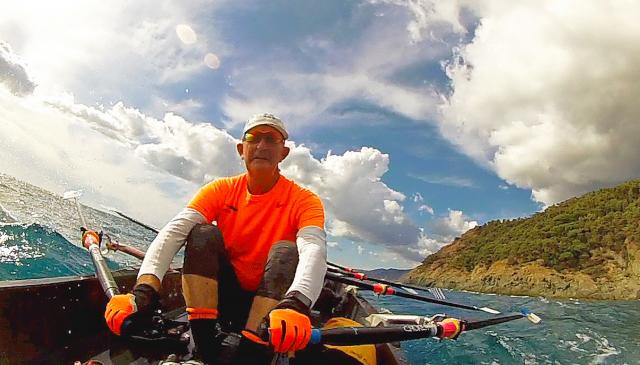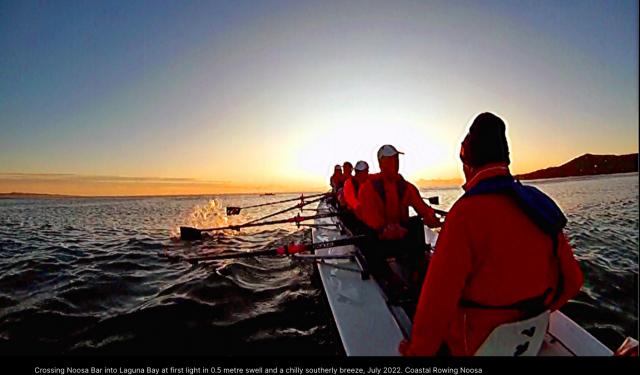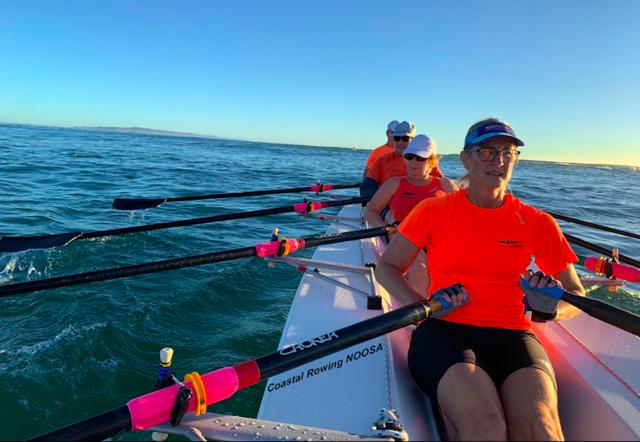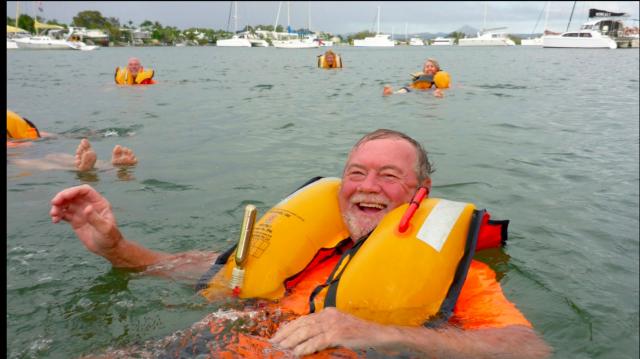The exciting format of beach sprint rowing, part of the Coastal Rowing discipline, will make its Olympic debut at the Los Angeles Games in 2028, paving the way for Noosa to emerge as the frontrunner to host the event at the 2032 Brisbane Olympics.
Following the International Olympic Committee’s announcement last month, an excited Sarah Cook, CEO of Rowing Australia, emailed her delight to rowing officials around Australia, noting that, “Collectively we have been working together to … build this discipline in Australia … and Rowing Australia is well positioned to continue … the growth and development nationally.”
But if anyone could match Ms Cook’s excitement over this hard-won Olympic inclusion, it would have been Peter Watson, secretary of Coastal Rowing Noosa, one of just two official coastal rowing clubs in Australia, and an acknowledged leader in promoting the fast-growing discipline, with a successful 2022 hosting of the Australian championships. Peter told Noosa Today: “What’s going to be required to get Noosa up as the venue in 2032 is a good marketing campaign from Rowing Australia, Rowing Qld and from Noosa itself. I think if we combine we can present a compelling campaign, and time is on our side. We have nine years to keep building our sport.”
As the IOC noted in its October announcement: “The inclusion of Beach Sprint Rowing in the 2028 Olympic Games programme is the outcome of a decade-long development of Coastal Rowing with the active support of our 159 members and rowing communities across the world. World Rowing has embarked on an ambitious, global growth strategy for the discipline, underpinned by increased investments across geographies and participation in high-profile multisport events.
“In 2023, Beach Sprint Rowing was featured at the World Rowing Beach Sprint Finals in Barletta, Italy, after being part of the Mediterranean Beach Games in Greece. The format will also be part of the 2026 Youth Olympic Games in Dakar, Senegal and the 2026 Commonwealth Games, in addition to other high-profile Continental multisport games and World Championships taking place every year. That global growth strategy will continue with the Los Angeles 2028 Olympics.”
In other words, everyone from the IOC down has recognised that coastal rowing, and particularly its marquee event, the beach sprint, is the sexy young sibling of traditional rowing disciplines which has the potential to bring surf life saving with it into the broad church of Olympic open water events, alongside recent additions like surfing. As World Rowing president Jean-Christophe Rolland noted at last month’s announcement: “The inclusion of Coastal Rowing at LA28, through the Beach Sprints format, is expected to be transformational for our sport in terms of global exposure, and in making an exciting form of rowing accessible to new populations. We believe Beach Sprint Rowing has the potential to enhance the Olympic programme by embracing beach culture and our shared values of universality, gender-equality and sustainability, while delivering genuine innovation in sport, broadcast and fan entertainment.”
According to Noosa’s Peter Watson, finally including the coastal beach sprint in the Olympics (following a rejection for Paris 24) makes a lot of sense: “Coastal rowing has a lot of advantages for Olympic hosts because you don’t need an Olympic rowing course. You run it off the beach, and the beach sprint is an exciting event for spectators. It starts with a sprint across the beach to the boat – a single, double or quad – then you row a slalom course 250 metres out and 250 metres back, which doesn’t sound like a lot, but if you’re going flat-out in challenging conditions, it can be pretty tricky. The final part is a sprint back across the beach to the timer button. You get some really good rowers in this, and they learn to row between the swells and maintain that speed, and sometimes that’s very hard. If a wave catches you, it’s going to roll you, which doesn’t mean you’re done, but it generally means you’ve got further to run to the finish than the others.”
Although the coastal rowing discipline has been growing quickly around the world, particularly across Europe, for more than a decade, its growth in Australia has been slower. The Noosa club, which has about 20 members, operates pretty much out of sight, out of mind, tucked behind the Noosa Yacht and Rowing Club, but the bigger Brisbane club, based at Redland Bay, doesn’t enjoy the ideal trifecta of river, bar and surf conditions for training that we have. Peter Watson believes that Noosa has all the right elements of beach culture in place to make it the best choice for this kind of Olympic event, and he is not alone. He says: “It will be a much more exciting event if it happens in Noosa. Locally, we have had productive discussions with Noosa Council about their ongoing support – we even got Deputy Mayor Frank Wilkie out on a boat and he loved it – and Noosa surf club president Ross Fisher is also supportive.”
Ross told Noosa Today: “Our surf club has a strong female and male surfboat rowing section in U17s through to U23s, so there may be an opportunity for both clubs to work together down the track.”
Noosa Today understands that a memorandum of understanding is being finalised between Rowing Australia and Surf Life Saving Australia to work jointly to maximise the potential of the coastal beach sprint event. Says Peter Watson: “The SLSA has basically looked at our sport and gone, we can do this! In the past Rowing Australia has been the only pathway to the Olympics for rowers, but this memo is about opening those doors and having surf life savers come into rowing. Of course, the IOC will make the final decision, but we see this as a great opportunity to get the 2032 event held on the Sunshine Coast, and the best venue would be Noosa, with its beach ideal for a large number of spectators. Our initial thoughts are that we’d be looking at 15,000.”
Noosa-based Olympic historian (and NT contributor) Ian Jobling has been following the rise of coastal rowing and the enthusiasm for it amongst the young. He believes the beautiful backdrop of Noosa’s beaches and rocky points will make the event compelling viewing. “And we have nine years to prepare so we can build this sport up so much now that youth will love it.”













